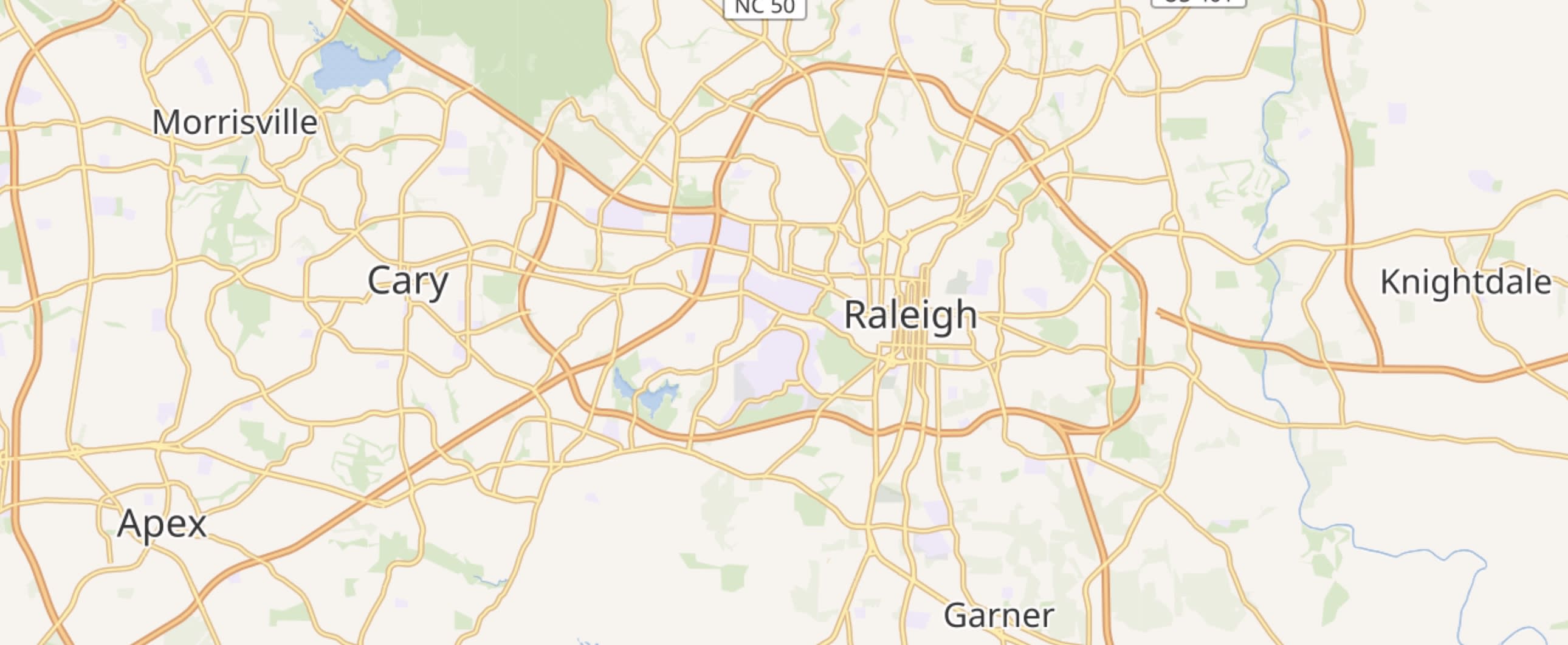

Considering a Move to the Raleigh-Cary Metro Area? Here’s What You Should Know.
Economy & Culture of the Raleigh-Cary Metro
The Raleigh-Cary metropolitan area, part of the larger Research Triangle (with Durham and Chapel Hill), is one of the fastest-growing regions in the U.S. About 1.5 million people call the greater Raleigh area home, and it consistently ranks at the top of rankings for quality of life, job growth, affordability, and education. The Raleigh metro blends a booming economy, green landscapes, strong universities, and suburban comfort, with easier commutes and lower housing costs than larger coastal cities.
Tech, life sciences, education, and government are the pillars here. Major employers include IBM, Cisco, Red Hat (now part of IBM), Epic Games, WakeMed, and the state government, and growth in those sectors keeps unemployment rates very low. The Research Triangle Park (RTP), one of the largest research and tech parks in the U.S., is a global magnet for talent and investment.
Culturally, Raleigh punches above its weight: with a growing food scene (James Beard-awarded chefs), very cool live music circuit, museums like the North Carolina Museum of Art, and tons of greenways and public parks. A mix of Southern hospitality, university-town brainpower, and entrepreneurial energy gives Raleigh a friendly southern vibe, but that is thoroughly mixed with an ambitious core.
Raleigh-Cary is one of America's premier "second cities," and many movers see it as a smart long-term bet.
Raleigh-Cary Metro Geography 101: How It’s Structured
The Raleigh metro is organized more like a spread of towns and suburban centers than a dense city core:
- Downtown Raleigh anchors the urban experience—state government, museums, bars, and restaurants.
- Midtown/North Raleigh offers suburban comforts with strong retail and green spaces.
- Cary is a major suburb southwest of Raleigh, known for master-planned communities and highly rated schools.
- Apex, Holly Springs, and Fuquay-Varina are booming family suburbs further southwest.
- Wake Forest and Rolesville offer growing family towns to the north.
- Morrisville sits between Raleigh and RTP, popular for tech workers.
Major highways like I-40, I-540, US-1, and I-440 tie it all together. The drive to Research Triangle Park from most parts of the metro is around 15–35 minutes, which keeps commutes relatively easy compared to bigger metros.
The Main Subregions of the Raleigh-Cary Metro
Downtown Raleigh and Central Raleigh
The Vibe: Walkable, energetic, youthful but grounded. A blend of government, universities, and a growing startup culture.
Why It Works: Easy city living, lots of breweries, restaurants, parks, and job centers.
Watch Out For: Rising housing prices, limited parking, and rapid gentrification.
Good Fit For:
- Young professionals
- Remote tech workers
- Government employees
- Artists
Check out LookyLOO's Deep Dive into Downtown Raleigh/Central Raleigh to better understand whether this area is right for you.
Midtown/North Raleigh
The Vibe: Suburban but still urban-accessible, with parks, shopping centers, and older neighborhoods being refreshed.
Why It Works: Affordable compared to downtown, good schools, lots of green space.
Watch Out For: Increasing traffic on I-540 and Wake Forest Road.
Good Fit For:
- Families
- Suburban professionals
- Buyers wanting space but also city access
Check out LookyLOO's Deep Dive into Midtown/North Raleigh to better understand whether this area is right for you.
Cary and Morrisville
The Vibe: Master-planned, safe, highly educated, and globally diverse. Known for outstanding schools and suburban comfort.
Why It Works: Great for families, tech workers, and those who prioritize quiet living and good amenities.
Watch Out For: Cary can feel "cookie-cutter" to some; rising home prices.
Good Fit For:
- Families
- Tech professionals
- Newcomers relocating for jobs at RTP
Check out LookyLOO's Deep Dive into Cary and Morrisville to better understand whether this area is right for you.
Apex, Holly Springs, Fuquay-Varina
The Vibe: Fast-growing small towns turning into suburban hubs, very family-centered, quieter and newer.
Why It Works: Newer homes, good schools, community life, a bit slower pace than Cary.
Watch Out For: Still developing; fewer cultural amenities than closer-in suburbs.
Good Fit For:
- Families looking for bigger homes for lower prices and a small-town feel.
Check out LookyLOO's Deep Dive into Apex, Holly Springs, & Fuquay-Varina to better understand whether this area is right for you.
Wake Forest, Rolesville, Northern Wake
The Vibe: Peaceful, semi-rural-suburban with a lot of new neighborhoods springing up.
Why It Works: More house for the money, lots of parks, strong family life vibe.
Watch Out For: Commute times are growing longer with expansion.
Good Fit For:
- Budget-conscious families
- Remote workers
- Buyers looking for elbow room
Check out LookyLOO's Deep Dive into Wake Forest, Rolesville, & Northern Wake to better understand whether this area is right for you.
TL;DR – How to Choose Where to Live in the Raleigh-Cary Metro
Subregion------------------------------------------Best For
- Downtown Raleigh/Central Raleigh----------------Young professionals, artists, remote workers, urban lifestyle
- Midtown/North Raleigh---------------------------Families, professionals, seeking space/greenery/good schools
- Cary and Morrisville-------------------------------Families prioritizing schools & masterplanning, RTP techies
- Apex, Holly Springs, Fuquay-Varina----------------Growing families, newer homes, lower prices, small-town vibe
- Wake Forest, Rolesville, Northern Wake-------------Budget-conscious families, remote workers, more land/house for the $
Final Thoughts: Where to Focus Your Search in the Raleigh-Cary Metro
If you’re looking for urban living with a creative, Southern city feel, Downtown Raleigh gives you walkability, culture, and easy access to jobs. If you want easy suburban living close to downtown, Midtown, and North Raleigh offer a perfect balance of parks, schools, and affordability. Families prioritizing elite schools, community safety, and suburban amenities will be happiest in Cary or Morrisville.
If you’re after newer homes, affordable space, and small-town community life, Apex, Holly Springs, and Fuquay-Varina deliver some of the best value in the metro. And if you're looking for bigger houses, more yard, and lower prices while still staying connected to Raleigh, Wake Forest and Rolesville, give you a semi-rural, suburban lifestyle without losing access to jobs and amenities.